Template:DRM manuscripts
Digitized collections of unpublished materials.
By Composer
Ludwig van Beethoven: Beethoven-Haus, Bonn
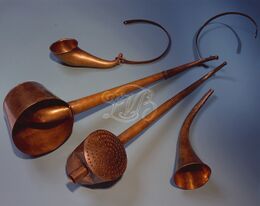
Website: http://www.beethoven-haus-bonn.de/sixcms/detail.php?template=startseite_digitales_archiv_de
The digital archive at the Beethoven-Haus, Bonn, contains manuscripts, sketches, letters, pictures, sample sound recordings, and much else. Beethoven lived here, and the physical museum also houses his instrument collection. A recently funded project involving the Beethoven-Haus and the Musikhochschule in Detmold will develop an ambitious "Beethoven Werkstaat" project taking viewers through the development of individual works by way of sketches and editions.
Beethoven Autographs Online
Website: http://www.bu.edu/beethovencenter/beethoven-autographs-online
Boston University's Beethoven Center offers several tools for Beethoven scholars and performers. Among them Beethoven Autographs Online is a one-stop shop for rare materials ranging from fragments, sketches, and cadenzas to complete manuscripts of full scores from libraries and private collections across Europe and North America. Its reference system conflates diverse work-numbering schemes into one easily searchable whole.
Beethovens Werkstatt (Beethoven's Workshop)
Website: http://beethovens-werkstatt.de/demo/index.html
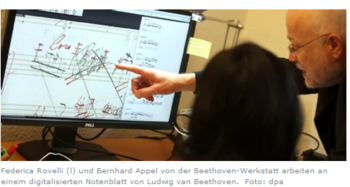
The ambitious Beethovens Werkstatt project, officially launched in 2014, will between now and 2030 reconstruct (with images and critical notes) the path of development of Beethoven's works from inception to completion. This project is based on the composer's sketch books, which in the digital version are to be carefully annotated with the help of the Music Encoding Initiative [MEI], a markup language for the encoding of musical sources facilitating their citation in critical editions. Bernhard Apel (Beethoven-Haus, Bonn) and Joachim Veit (Musikwissenschaftliches Institut, Detmold/Padlerborn) are the project directors. Johannes Kepper (Edirom project) is centrally involved in the technical development of both Werkstatt and MEI. The link above shows a prototype browser for viewing both manuscript iterations and modern notation for variants in the first movement of Beethoven's C-Minor Piano Sonata Op. 111 in Variants 14–17 (Beethoven-Haus BH 71).
Johannes Brahms Institute
Website: http://www.brahms-institut.de/web/bihl_digital/autographe.html
The Brahms Institute in Lübeck hosts a composite site for autographs, early editions, letters, and other kinds of documentation associated with Brahms. In this last category are such things as concert programs and fragments of music, drawings, and photographs of and by his associates.
See also the Johannes Brahms organization site.
Web Archive Anton Bruckner
Website: http://www.bruckner-online.at
The multi-faceted Anton Brucker web archive at the Austrian Academy of Sciences contains 26,000 images of the composer's autographs and early copies plus 6000 images of early prints. An associated database cites c. 10,000 works and related literature. The project is managed by Robert Klugseder. Online editions prepared with Edirom are in preparation.
John Cage Living Archive
Website: http://exhibitions.nypl.org/johncage/manuscripts
The New York Public Library for the Performing Arts, in collaboration with the John Cage Trust and the publisher C. F. Peters, hosts this sampler of Cage's physically diverse manuscripts. At a glance the reader can see the broad diversity of Cage's approaches--arithmetical, schematic, electronic, and aleatoric. A search engine has filters for video, manuscript, and ephemeral material. Video contributions of performances of Cage's music are actively sought via this form.
The Aaron Copland Collection (Library of Congress)
Website: http://www.loc.gov/collection/aaron-copland/about-this-collection
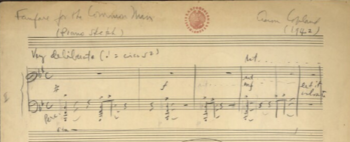
The Aaron Copland Collection, available at the Library of Congress, is an exceedingly rich one that contains every imaginable kind of evidence of the composer's long life (1900–1990)—manuscripts, sketches, typescripts for talks, personal photographs (roughly 5,000 of them), childhood mementos, and letters. Apart from photos, 981 other items can be found here.
Materials pertaining to Edvard Grieg
Website: http://bergenbibliotek.no/digitale-samlinger/grieg/english
Shortly before his death Edvard Grieg (1843-1907) arranged for the donation of all his music, letters, and related materials to the Bergen Public Library. The origins of the digitization project date back to 1993, the 150th anniversary of Grieg's birth. Grieg had a deep interest in recording technologies of his time. Starting in 1903 he made nine recordings of his music (on 78s), player-piano rolls from live-performance (Ludwig Hupfeld's Phonola and Welte-Mignon), and the Aeolian Company. For the last he suggested tempo mappings.
Handel's Messiah and other virtual "page-turners" from the British Library
Websites: See below.
The British Library's Virtual Books website contains a number of important manuscripts, the folios of which can be "turned" by the user. In addition to the autograph score of Handel's Messiah, "Sumer is icumen in", the Old Hall manuscript, the manuscript for Book II of J. S. Bach's Well Tempered Clavier, a Purcell anthem for the coronation (1685) of James II, sketches for Beethoven's Sixth ("Pastoral") Symphony, Elgar's "Enigma" Variations, and Mozart's musical diary (Zweig MS 63) are set up in similar fashion. A listing of other viewable musical works can be found here.
Handel autographs and other music manuscripts
The British Library completed the digitization of 38 Handel autograph manuscripts in 2016. They are accessed through the Library's "catalogs, archives, and manuscripts" website, where the user may limit the date range (slider at the bottom of the form). An author search for "Handel autographs" (currently yielding 168 hits) picks up unrelated miscellany, while a search for Handel alone produces a list of 103 titles. Items listed range from definitive scores of myriad operas, oratorios, cantatas, and other vocal and choral works to miscellaneous pieces (especially arias) collected by John Christopher Smith, Handel's copyist.
Among other composers represented, we find 311 manuscripts associated with the Bach family (52). Searches for other composers yield these figures: Thomas Arne (57), Giovanni Bononcini (58), William Boyce (115), William Byrd (141), Joseph Haydn (239), Orlando de Lassus (48), Benedetto Marcello (52), Wolfgang Amadeus Mozart (297), Pierluigi Palestrina (99), Giovanni Paisiello (84), Henry Purcell (233), and Alessandro Scarlatti (84), Franz Schubert (95), and William Walton (374).
The Handel autographs all have live links (2016), while many other listings currently contain catalog information. Holdings responding to composer searches may also yield correspondence, deeds, and other personal papers.
Michael Haydn Manuscripts
Website: http://daten.digitale-sammlungen.de/~db/ausgaben/uni_ausgabe.html?projekt=1384445203
181 comprehensive titles from the Bavarian State Library. The heavy emphasis on liturgical music reflects Haydn's lifetime involvement in church music, mainly in Salzburg and Vienna.
Gustav Mahler Autograph Manuscripts
Website: http://daten.digitale-sammlungen.de/~db/ausgaben/uni_ausgabe.html?projekt=1384445807
30 volumes of autograph manuscripts by Gustav Mahler are housed in the Bavarian State Library (Munich). Offerings include Das Knaben Wunderhorn, sketches for three symphonies, and Mahler's correspondence with Emil Hertzka.
Felix Mendelssohn Materials (Library of Congress)
Website: http://www.loc.gov/collections/felix-mendelssohn
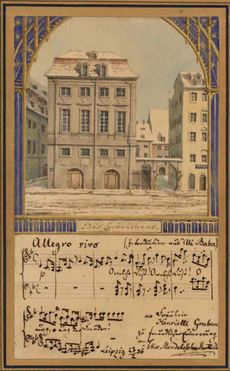
The Library of Congress holds a collection of miscellaneous Mendelssohn memorabilia that includes letters, lithographs, printed, and manuscript music. The illustration here shows a watercolor of the Gewandhaus, Leipzig, by Mendelssohn from the scrapbook of Henriette Grabau, a singer who appeared there when Mendelssohn conducted in 1836. The musical except beneath it comes from the Cherubini's opera Ali Baba. Manuscripts of the Lieder ohne Wörte and the Octet, as well as drawings from his travels in Italy, are among the holdings.
Carl Orff Autograph Manuscripts
Website: http://daten.digitale-sammlungen.de/~db/ausgaben/uni_ausgabe.html?projekt=1384446061&l=de
This collection of manuscript materials (91 titles) documents the musical career of Carl Orff (1895–1982). It includes, Lieder, stage works, modern arrangements of Monteverdi operas, and other materials. Because of continuing copyright restrictions, many items can be consulted only on site in the Bavarian State Library. Nonetheless the detailed listing is valuable in documenting the range of Orff's interests and activities.
Max Reger Autograph Manuscripts
Website: http://daten.digitale-sammlungen.de/~db/ausgaben/uni_ausgabe.html?projekt=1384445879&l=de
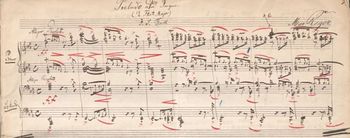
The music of Max Reger (1873–1916) occupies a unique place in the keyboard repertory of its time. His organ works are better known than his other music—concertos, Lieder, choral works, and a clarinet quintet. Forty titles are viewable here.
Cipriano de Rore: Illuminated Choirbook from the Court of Albrecht V
Website: http://daten.digitale-sammlungen.de/~db/0010/bsb00103729/images/index.html
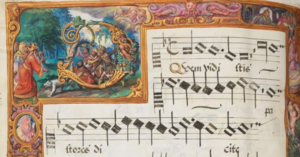
The brilliant colors and generous proportions of this choirbook, illuminated by Hans Mielich (1516-1573) for the Court of Albrecht V of Bavaria are stunning to behold. It is dated 1559. The books includes portraits of the duke, Duchess Anna, and of the composer. Rore (c. 1515-1565) was mainly active in Italy. He moved to Munich from Ferrara in the summer of 1559, which suggests that the bulk of the motets found here were composed prior to his arrival. Two volumes of his motets had been published in Venice in the 1540s. A further one followed in 1563.
The Arnold Schönberg Center
Website: http://www.schoenberg.at/index.php/en
The Arnold Schönberg Center in Vienna holds a cornucopia of Schönberg memorabilia that extends to film footage of the composer's real-world experiences such as being briefly employed as an auto salesman, his "contacts" list, and personal photographs, provides an online list of works, biographical sources, and information on performing rites. Autograph fair copies, sketches and drafts of Schönberg's compositions; autograph manuscripts and other primary sources for Schönberg’s theoretical writings and literary works; writings on musical pedagogy, as well as lectures and teaching materials; early printed copies of Schönberg’s works, including autograph annotations, performance instructions, and revisions; personal documents; Schönberg’s complete library; programs, reviews, posters; photographs and audiovisual documents all form part of the collection.
Schubert Online
Website: http://www.schubert-online.at

Schubert Online offers combined access to a total of 636 autograph scores, letters, and other documentation on Schubert. Much of the work was facilitated by the Vienna Science and Technology Fund [WWTF or Wiener Wissenschafts-, Forschungs- und Technologiefonds]. Digitized holdings come from Vienna's City Hall [Rathaus], the Austrian National Library, the State Library of Berlin, and the National Library of Norway, with intellectual contributions from the Music and Psychology program in Cologne and the Musicology Institute at the University of Vienna. Full-text search is supported for the letters. Deutsch Numbers are used to identify the manuscripts.
Strauss Online
Website: http://www.digital.wienbibliothek.at/nav/classification/301934
The music of three Johanns (father, son, uncle), one Josef, and one Eduard is represented at this website based at the city library of Vienna. More than 300 works are available here. Almost 200 of them are by Johann Strauss the younger, the waltz king. A few sketches, operettas, marches et al. are included. The minor Strausses composed polkas as well as other short instrumental pieces. Eduard's Theorie der Musik from c. 1845-50 can be downloaded here. An online catalogue of the library's printed works is available here.
Richard Strauss: Musical Autographs
Website: http://daten.digitale-sammlungen.de/~db/ausgaben/uni_ausgabe.html?projekt=1384446235
Among these 84 titles are numerous sketches, fragmentary compositions, and Lieder. The originals are held in the Bavarian State Library.
Verdi Online
Website: http://www.verdi.san.beniculturali.it/verdi/?lang=it
The Verdi Online collaboration hosts diverse materials--libretti, letters, portraits and figurines, bibliography, discography, and large quantites of background information about places and people associated with Giuseppe Verdi.
Georg Josef Vogler Music Manuscripts
Abbe Vogler (1749–1814) left a substantial collection of manuscripts (75 titles) that includes chamber and sacred music, concertos and symphonies, plus several items that relate to his opera Castor et Pollux.
Richard Wagner: Notebooks, music manuscripts, and correspondence
This collection of unpublished materials from the archive of the Bavarian State Opera brings Wagner's goals and working habits into our midst. Under 170 rubrics it documents the composer's movements, collaborators, and evolving ideas about music and role of music in society. They also give a more rounded view of his range of interests than many published accounts.
Robert Ward Papers
Website: https://archives.lib.duke.edu/catalog/wardrobert
Robert Ward was an American composer primarily of operas, instrumental works, and symphonic choral works. He won the 1962 Pulitzer Prize in Music for his opera, The Crucible, which remains his best-known work. His exceptionally long life (1910-2012) enabled him to compose for 95 years! Ward studied at the Eastman School of Music in the 1930s and subsequently taught at Columbia University, North arolina School of the Arts, and Duke University.
Manuscripts of Ermanno Wolf-Ferrari
Website: http://daten.digitale-sammlungen.de/~db/ausgaben/uni_ausgabe.html?projekt=1384446335&l=de
Ermanno Wolf-Ferrari (1876–1948) followed the path of aspiring students of his time in examining the details of earlier composers' practices. This collection of his manuscripts (175 titles) includes transcriptions of keyboard works by J. S. Bach, sketches of operas, concertos, symphonies, comic operas, a passion, sonatas, string quartets, and other chamber music.
By Collection
Corpus Musicae Ottomanicae (CMO)
Website: https://www.uni-muenster.de/CMO-Edition/cmo/cmo.html
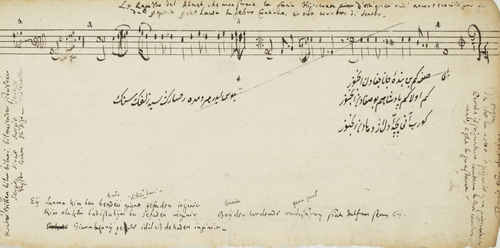
This recently announced project (2020) to digitize and transcribe manuscripts of Middle Eastern Music, named the Corpus Musicae Ottomanicae (CMO), concentrates on musical materials originating in the Middle East in the seventeenth through nineteenth centuries. A digital critical edition based on the collection is being prepared under the auspices of the Institute for Arabic and Islamic Studies at the Westphalian University in Münster, DE. Detailing of musical performance practices is an intended area of focus. ʿAlī Ufuḳī, sold to the sultan's court in Istanbul as a slave in the seventeenth century, was a rapt student of culture who gathered vast quantities of information about language and customs during his many years at court. He transliterated texts and notated melodies provide offer glimpses of style ad substance that are rare, for in general music was not notated. Custom required the music to be read from right to left.
Digital Collections in the Berlin State Library
Website: http://digital.staatsbibliothek-berlin.de/suche/?DC=musik
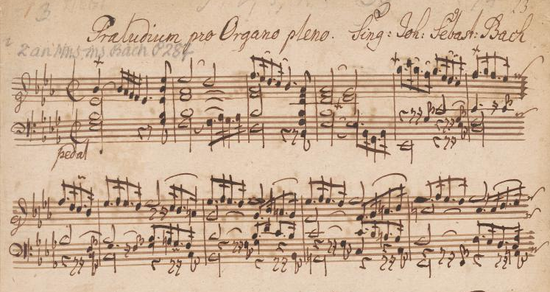
The 7,348 digitized music items at the Berlin State Library website include manuscripts, prints, libretti, poetic texts for Lieder, and much else. Of interest to Beethoven scholars are the composer's conversation books (1820, 1825, 1826). Other offerings include writings by and about https://en.wikipedia.org/wiki/Richard_Wagner Richard Wagner}; music in manuscript by Franz Liszt; letters to Clara Schumann by Johannes Brahms (and many others); prints, manuscript, and letters by Felix Mendelssohn; and copious amounts of eighteenth-century music, some of it in nineteenth-century manuscript copies.
Digitized Manuscripts in the University and Regional Library Darmstadt
Among the 2,909 music manuscripts in the music section of this heterogeneous collection, those of Christoph Graupner play a major role. (See the Graupner entry under Thematic Catalogues.) Most of the items come from the long eighteenth century, when they sustained the life of the court and the city. Other composers of note include Attilio Ariosti, Jo. Chr. Bach, Georg Benda, Jo. Friedrich Fasch, Jo. Gottlied Graun, Jo. David Heinichen, G. Ph. Telemann, Abbé G. J. Vogler, and several nineteenth-century masters.
Rare Music Manuscripts in the British Library
Website: http://www.bl.uk/onlinegallery/onlineex/musicmanu
See the Old Hall manuscript, Purcell's coronation anthem for James II, an excerpt from Handel's Messiah, Bach's autograph for Book Two of the Well-Tempered Clavier, Mozart's thematic catalogue of his composition, Beethoven's sketches for the Sixth Symphony ("Pastoral"), and much else. (Music manscripts make up just one part of the holdings viewable at this portal.)
E-codices: The Virtual Manuscript Library of Switzerland
Website: http://www.e-codices.unifr.ch/en
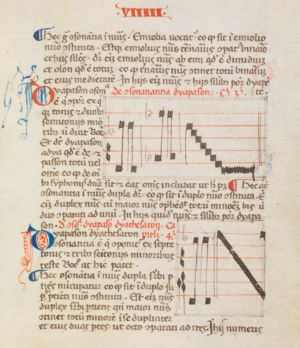
In many ways e-codices, the Virtual Manuscript Library of Switzerland, is an unsurpassed example of maximal access to fundamental but rarely seen sources. Currently serving almost 1,400 parchments and manuscripts, its online existence began in 2007. Its value to musicology owes partly to a tight coupling between early histories of music and the sources on which these accounts were often based. The digital apparatus is very clearly articulated, and it search by many rubrics is possible. Access to color images of the materials long known only from running-text summaries of them enables users to pose new questions of interpretation. Users can construct new juxtapositions and concatenations of source details in relationships that could not previously be explored. An annotation tool enables users to highlight pertinent findings. e-codices is based on like-named software, which holds the distinction of running equally well on mobile and non-mobile platforms. An author list is available here.
Among its many riches to be found are these rare items:
- Writings of Hucbaldus (840–930) from the Benedictine abbey at Einsiedeln.
- The Ars contrapunctus of Philippe de Vitry (1291–1361) from the Benedictine abbey at Einsiedeln.
- Fragment (in Latin) of a writing by Moses Maimonides (1135–1204).
Recent software enhancements and links for the e-codices newsletter are available. A tablet viewer also exists.
Early Keyboard Manuscripts at Yale University
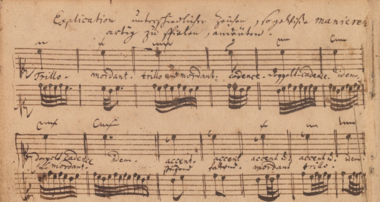
The Beinecke Library at Yale University holds substantial collections of music manuscripts, not all of it digitized to date. Highlights include not only notebooks for members of the Bach family but also chorale settings, manuscripts by Alessandro Scarlatti, seventeenth-century English music for instrumental ensembles, and transcriptions by Ezra Pound. The Orbis catalogue linked includes a wide range of items.
Fragmentarium
Website: https://fragmentarium.ms
Fragmentarium is not so much a single project as a global effort in digital restoration to locate, identify, and, where possible enhance nominally lost fragments of medieval manuscripts. The material is not exclusively musical, but since music was an adjunct to medieval manuscripts, Fragmentarium's availability to music scholars is an important resource. Fragmentarium is based at the Universiuty of Fribourg (CH) and is directed by Christoph Früeler. As of May 2022 it included nearly 3,000 items.
Gaffurius Codices Online
Website: https://www.gaffurius-codices.ch/s/portal/page/home
Franchinus Gaffurius (1451–1522) was a noted music theorist whose compositions, largely associated with his tenure as maestro di cappella at the Milan Cathedral, are little known. The Gaffurius Codices Online is devoted to inventorying the four Libroni containing the sacred vocal music he composed at this time, which coincided with the peak of Milan's Sforza rulers. (Leonardo da Vinci enjoyed a great deal of patronage from the Sforza family.) Gaffurius was a near contemporary of Josquin des Prez. The chief focus of this project is on the motets contained in the four large volumes. The contents will be captured in IIIF images suitable for sophisticated uses in a digital environment. A database containing important metadata will be developed in conjunction with the imaging. A digital critical edition is intended at a later time. the Gaffurius project is being developed by the Schola Cantorum Basiliensis in conjunction with the Swiss National Science Foundation.
Handrit: Historical (Music) Manuscripts from Iceland
Website: http://handrit.is/en/Handrit
This collection from the National and University Library, Reykjavik, contains historical manuscripts from Iceland. To find music, select Browse, Keywords, Arts, Music. Sources range from the 15th through 19th centuries.
Integrated Database for Early Music (IDEM)
Website: http://www.idemdatabase.org/alamire
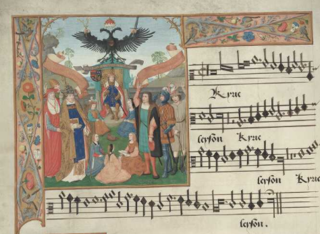
The Integrated Database for Early Music (IDEM), seated in the Musicology Research Unit (Katholieke Universiteit, Leuven), is an interdisciplinary, multifaceted database of manuscripts and printed books. Under the auspices of the Alamire Foundation, an international center for the study of music in the Low Countries, IDEM focuses on the musical heritage of these countries from the early Middle Ages until 1800.
The IDEM collection of digital images is coordinated with a central database of primary sources. Images are digitized by the Alamire Digital Lab, which provides high-technology photography at its Centre in Leuven, where state-of-the-art equipment allows musical sources to be photographed following strict quality requirements.
The Juilliard Manuscript Collection
Website: http://juilliardmanuscriptcollection.org/composers
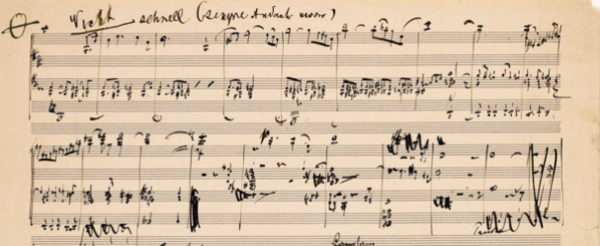
Among its 221 music manuscripts posted online, the Juilliard School possesses many unexpected items and substantial coverage of twentieth-century British and American composers (Samuel Barber, Frank Bridge) and many European composers whose music was popular in the US. Other collections represented at Juilliard include the collections of pianist Arthur Rubinstein and the popular composer of musicals Meredith Wilson (1902–1984).
Music Gifts for the Russian Emperors
Website: http://expositions.nlr.ru/MusicalManuscripts/eng/project.php
The National Library of Russia has made available this carefully curated collection of music given to Romanov emperors by visitors from France, Italy, Germany, and elsewhere. Many holdings come from Russia, where Western European music was introduced early in the eighteenth century. Holdings come from the 18th–20th centuries. Some of the music was brought by foreign teachers (e.g., Vincenzo Manfredini) for the royal progeny. Many works were provided with dedications to the emperors. Czech and Austrian music flowed copiously into Moscow at the end of the eighteenth century. A "Festival Song" by Felix Mendelssohn has a particularly interesting history, which is related here. The digitized pieces are linked to a database containing information about the social context and pertinent musical detail. The list of manuscripts (using Cyrillic script) can be found here, while a search engine (Roman script) is here. Drop-down lists contain listing in both Cyrillic and Roman, as appropriate, while the popup keyboard facilitates Cyrillic input. Source descriptions are in Russian.
Music Manuscripts in the Bavarian State Library
This rich collection of 2,697 digitized manuscripts is well endowed with music of the eighteenth and nineteenth centuries. Sample holdings include Alessandro Scarlatti's Missa Clementina, Antonio Caldara's sacred cantata "Gesu Cristo condannato", sacred vocal music by Michael Haydn, Handel's Deidamia, works by Karl Ditters von Dittersdorf, Dallapiccola, stage works by Richard Strauss, manuscripts of Carl Orff, and much other music.
The Moldenhauer Archives (Contemporary Music in Manuscript)
Website: http://memory.loc.gov/ammem/collections/moldenhauer/index.html
The Moldenhauer Archives began with the focus of teaching music history through primary sources. Its founder was Hans Moldenhauer (1906-1987) made the collection a memorial after his wife, Rosaleen, and donated it to the Library of Congress and eight other libraries including the Paul Sacher Stiftung (Basel), others in Cambridge MA, Evanston IL, Munich, Vienna, Zurich, and two in the state of Washington with which the Moldenhauers had personal connections--Washington State University and Whitworth College in Spokane. Its 3,500 manuscripts and letters, while representing a history of music and musical notation from ancient to recent times, is particularly valuable for its autographs of the latter. An online guide documents its contents, in many cases with essays on individual holdings.
Music Manuscripts in the Marciana National Library (Venice)
Website: Internet Culturale: Music Manuscripts in the Marciana National Library
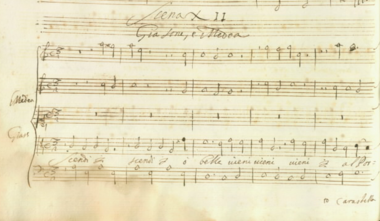
The Library of St. Mark (or Biblioteca Nazionale "Marciana") in Venice holds acquisitions that have been accumulating since the sixteenth century. Following guidelines widely shared across music libraries in Italy, it has digitized music manuscripts that are most closely tied to Venice's musical history. These include many important sources for seventeenth-century Venetian opera (Francesco Cavalli, Domenico Freschi, Giovanni Legrenzi, Carlo Pallavicino, P.A. and M.A. Ziani (operas can be accessed by act); 66 volumes containing cantatas of the eighteenth century by Benedetto Marcello (471 titles) and his nemesis Antonio Lotti; minuets by Baldassare Galuppi; and all the keyboard sonatas of Domenico Scarlatti (358 titles).
Music Manuscripts Online
Website: http://www.themorgan.org/music
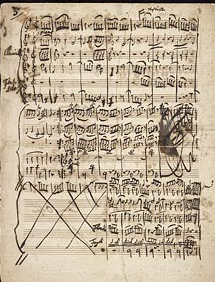
This collection of more than 700 manuscripts at the Morgan Library (New York) comes chiefly from eighteenth- to early twentieth-century composers (including but not limited to J. S. Bach, Beethoven, Brahms, Cherubini, Chopin, Debussy, Fauré, Gershwin, Glinka, Gluck, Handel, Haydn, Herbert, Liszt, Mahler, Massenet, Mendelssohn, Meyerbeer, Mozart, Mussorgsky, Paër, Pergolesi, Puccini, Saint-Saëns, Schubert, Schumann, and Wagner). An integrated browsing tool takes the viewer through music prints and manuscripts. The Library has recently made available its Goode EReader. Readers may now download images of manuscripts not currently under copyright. Searchable composer and manuscript lists facilitate individual searches.
Nuova Biblioteca Manoscritta (NBM)
Website: https://www.nuovabibliotecamanoscritta.it/catalogo.html
The Nuova Biblioteca Manoscritta (New Manuscript Library) is a regional resource for locating (and somertimes viewing) manuscripts from the modern Venetian state. It contains almost 30,000 items, but fewer than 500 of these contain music. Many other regional resources in Italy (e.g., Florence, Lombardy) and national catalogues are listed in online catalog of the Biblioteca Scuola Superiore Normale.
ORFEUS: The Post-Tridentine Music of Silence in the Cloister of S. Bento de Castris, Evora
Website: http://www.orfeus.pt
Thirteen choirbooks from the sixteenth to the eighteenth centuries in the monastery of S. Bento de Castris, Evora (Portugal), have been digitized by CIDEHUS, the Interdisciplinary Centre for History, Culture, and Societies. Luis Hennriques directs the project. The choirbooks are described individually here.
Music Treasures Consortium
Website: http://lcweb2.loc.gov/diglib/ihas/html/treasures/treasures-home.html
This aggregation includes both manuscript and out-of-copyright printed sources in more than a dozen institutions in the US, UK, and Germany. The browsing pages links users to the individual collections. The material is highly diverse but comes principally from the nineteenth century.
POLONA
Website: http://polona.pl
Polona presents the digital collections of the National Library of Poland. Digitized manuscripts and printed music are available. Registered website users can save materials to their own collections. Printed music can be found under Biblioteka, then Nuty. Manuscripts can be found under Biblioteka, then Rękopisy; from there, go to the filters and select Gatunek, then rękopisy muzyczne. Filters are available for authors, publishers, languages, form/genres, keywords, and century.
Saxon State Library (SLUB), Dresden: Royal Private Music Collection
This rich collection of the Wettin court, starting from the time of August the Strong and continuing to 1896, when it was donated to the Royal Library, is rich in holdings of sacred vocal music and Italian opera. Today it resides in the Saxon State and University Library (SLUB in the German ordering). The online holdings have been subdivided into these components:
The Opera Archive, which includes libretti, scores, and extracts, is currently being digitized. It overlaps the collaborative project Opera in Italy and Germany (1770-1830). This collection contains roughly 650 operas and opera extracts from the years 1764 to 1900. The private collections of court and church music include 750 manuscripts from the years 1697-1763.
Saxon State Library (SLUB): Court Music in Dresden
Website: http://hofmusik.slub-dresden.de
The current familiar name of this collection, Schrank II, is the name of the cabinet in which this important collection was long stored. It is a rich collection of instrumental music, mainly from the eighteenth century. Much of it is in the hand of Johann Georg Pisendel, an intrepid transcriber and collector of Italian (particularly Venetian) instrumental music. It contains 1,795 listings in 1750 physical manuscripts. By clicking on the highlighted text in the first sentence of the description users can download a spreadsheet with a full listing of holdings, most of which are digitized and are linked to the RISM OPAC.
Slovenian Digital Library
Website: http://www.dlib.si
The Digital Library of Slovenia includes in its Pictures section scans of music (and articles about music) published in Slovenia. Select notno gravido from the left frame on the Pictures tab. Dates of sheet-music publication range from 1862 to 1930, with a strong concentration in the late 1920s. Songbooks, especially from the first decade of the twentieth century, are also numerous.
Spanish Digital Library (Biblioteca Nacional Hispanica)
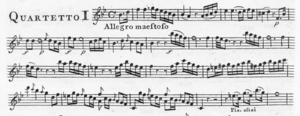
This heterogeneous collection of digitized materials--26,788 manuscripts and 4,347 printed sources--is impressive in its chronological and cultural range. Contains some eighteenth-century music for strings (Boccherini, Sacchini, et al.) and many sources from the late 19th and early 20th centuries.
By Repertory
Cambridge Lute Books
Website: http://cudl.lib.cam.ac.uk/view/MS-DD-00005-00078-00003/1
This link takes you to the second of four lute books compiled by Mathew Holmes and preserved in the Cambridge University Library. Its companions are the Cosens Lute Book and a volume of fragments of Elizabethan music for lute. Holmes was a singer at Christ Church, Oxford, and at Westminster Abbey. Cosens was a nineteenth-century owner of this collection of sixteenth-century music.
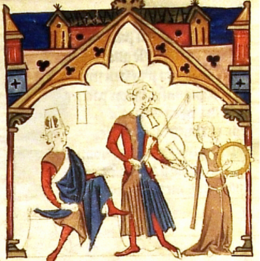
Cantigas Medievais Galego-Portuguesas
Website: http://cantigas.fcsh.unl.pt/manuscritos.asp
This website provides links to collections of manuscripts containing cantigas of Gallic and Portuguese origin. Many are preserved in the Vatican Library. The contents of each source is indexed, with full texts given in many cases. A sample folio is shown for each source. Titles are listed online.
Cantus Planus
Website: https://www.cantusplanus.at/de-at
In distinction to the Cantus Planus project focused on chant indexing (from the 1980s through today, under the auspices of the International Musicological Society), this website, operating under the auspices of the Austrian Academy of Sciences in Vienna, with a base at the Austrian National Library, provides a sophisticated array of digital tools and repositories for the study of medieval music. The scope of the project embraces six parts:
- Cantus Planus Austria: the primary web platform for the choral music in Austria
- Nationalbibliothek: Medieval music sources in the Austrian National Library
- Fragmente: Fragments of medieval music in the Austrian National Library
- Austriaca: Information on music manuscripts in Austrian libraries
- Text and Music Recognition: automatic recognition, transcription, and text acquisition of textual content in choral sourcces
- Bilddatenbank: an image bank of medieval music manuscripts.
Robert Klugseder directs the project.
Musica restaurata
Website: http://www.vaticanlibrary.va/home.php?pag=in_evidenza_art_00187
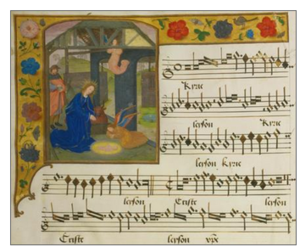
Illuminated manuscripts associated with the Low Countries in the Vatican Library can be viewed in high resolution owing to the generous support of the Alamire Foundation (Leuven, Belgium). The contents at the end of 2012 totaled 13,500 images. The image shown here comes from the workshop of Pierre Alamire (c. 1470–1536). Alamire's workshop produced many important manuscripts of the music of Johannes Ockeghem, Josquin des Prez, Adriano Willaert, and Pierre de la Rue. Alamire was a vendor of manuscripts who also used his innocent musical pursuits to conceal his operations as a spy for King Henry VIII. Manuscripts from his workshop can be found in several other European venues including Munich, Vienna, Brussels.
Polish Benedictine Music
Website: http://chrum.studiokropka.pl/st_test
This multifaceted project provides digitized images of sacred and liturgical music from Benedictine convents in the environs of Krakov. The musical sources are primarily from the 16th and 17th centuries. In addition to searchable digitized images, it also contains considerable metadata and many links to related resources as well as analytical information. An English translation is in progress.
Scottish Fiddle Tunes (Collections)
Website: http://hms.scot
More than 200 books of airs, reels, hornpipes, and strathspeys are reproduced at this website at the University of Glascow. Search by title, genre etc is facilitated in an associated databse. Some sources contain period annotations. The bulk are notated on two staves in the manner of keyboard music.
Swedish Musical Heritage
Website: http://www.swedishmusicalheritage.com
The Swedish Musical Heritage website represents an ongoing collaboration to make available all out-of-copyright music by Swedish composers. The alphabetical database of holdings is easily searched. It provides filters for instrumentation, composer's gender, century, and duration of each recording. Materials served include reproductions of scores, recordings of radio broadcasts, biographical information, and other related holdings of several musical institutions. Many Swedes were employed abroad, especially in Germany, and much foreign music found its way to Sweden via Germany.